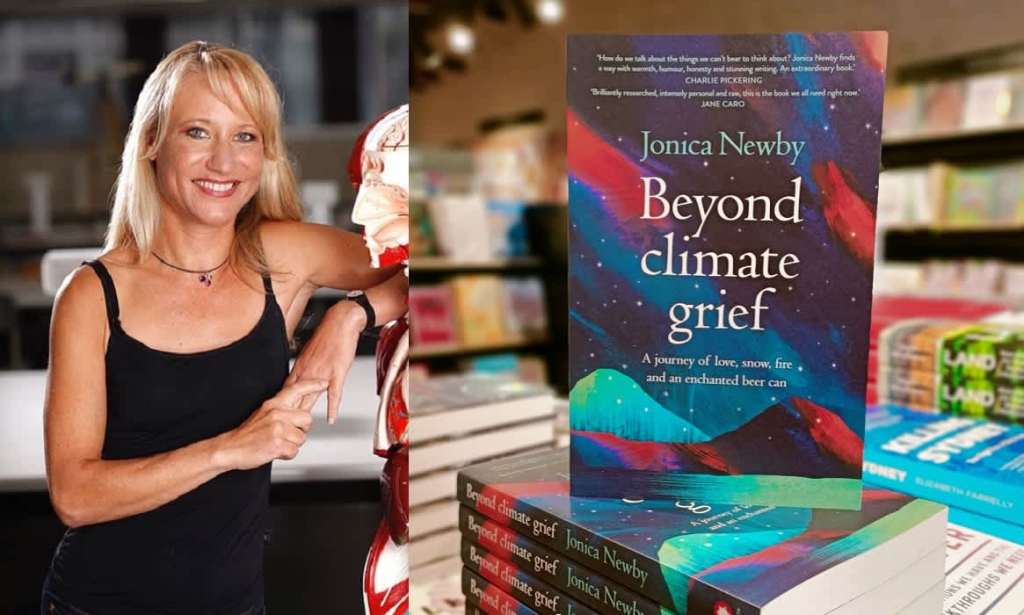In her groundbreaking book This Changes Everything: Capitalism vs. The Climate, author Naomi Klein makes the point that failing to look clearly at climate change is another form of climate denial. She references a pattern of turning away from the realities of the potentially species-ending disaster that is looming all around us because it’s simply too hard to contain all of that knowledge in our day-to-day lives.
“A great many of us engage in this kind of climate change denial. We look for a split second and then we look away. Or we look but then turn it into a joke (‘more signs of the Apocalypse!’). Which is another way of looking away.”
What Klein is talking about here, our inability to deal with the realities of our time, is wrapped up in the notion of climate grief. It’s a term that has come to be used to explain the unease we feel with planning for the long term future, the pain we experience when hearing about coral bleaching, birds so endangered they no longer know their own song, and of course, the fires, floods, and plagues of biblical proportion that have ravaged our planet in recent years.
We’re in a state of semi-conscious shock and trauma at what has passed and what is still to come. It’s no wonder that fewer and fewer young people want to have children, and that travel – escapism at the expense of financial stability – so we can see places and things before they disappear, is so popular.
But it’s no way to live. It’s disturbing and frightening and, above all, emotionally draining to have to think about savings and five year plans when you know in the back of your mind that the future is going to be a much less habitable place than the past.
This is why Dr Jonica Newby’s new book, Beyond Climate Grief, is so necessary right now. The sort of bleak dialogue above is exactly the kind of thing we try and avoid and this new work is a response to the overwhelming nature of it all.
“It gets to the point where you already know it and knowing more detail is just toxic,” Newby explains. “It doesn’t mean closing your eyes, but it does mean a bit strategic.”
Newby is a science reporter, author, TV presenter and director best known for her two decades on ABC TV’s popular weekly science program, Catalyst. Working in the territory of science at a time like this is to expose yourself to the blunt truths of climate breakdown and the emotional toll that comes with that.
“I had this really profound experience of climate grief a couple of years ago when I realised what was going to happen to my snow country, all of our snow country, my heart lands.
“I really struggled to get through that and that’s how I suddenly thought, ‘I need to write a book. I need to find out more about how to process these feelings in a way that’s positive and livable.’
“That was one of the driving questions in the book. How do I live a good and happy life under the weight of this fearsome knowledge?”
It’s a question many of us have asked ourselves at some point and typically we don’t have answers, we usually just stop thinking about it because it’s simply too depressing.
Newby has answers, and not the kind of glib, easy-fix answers that we want or need. Instead, her book is a narrative journey through the stages of grief to help us better understand how to cope with the emotions we are feeling.
Newby takes her own lived experience of her husband’s cancer diagnosis and battle as a reference point for understanding the climate. She writes: “There were points when I couldn’t know if the outcome would be life or death for him. Bravery was needed then. Fear and pain overwhelmed sometimes. But you keep going. Because while there’s life there’s love – and there’s always, always hope”.
In coping with the possible loss of a loved one, Newby sets out to develop further these emotional tools and coping strategies in order to apply them on a planetary scale.
The book is structured as a series of interviews and encounters with psychologists, scientists, professors, buisness tycoons, musicians, and comedians, as well as some of the heroes of the climate struggle like the children of Castlemaine School who struck up a climate strike before even Greta Thunberg had drawn up her placards. Missy Higgins pops up in there, as does Charlie Pickering and Mike Cannon Brookes.
Each chapter is titled with an emotion – a familiar one when looking at the climate like grief, courage, denial, or horror – and seeks to explore that emotion and how to process it. Within the pages there are stories and statements of universal relevance. Stories of parents dealing with how to explain all of this to their children, comedians and coral scientists using black humour to process what is happening, and the people of Mallacoota who faced down the worst incarnations of climate inaction.
The book itself is not a passive acceptance of what is to come, more a soothing elegy for times of crisis, designed to steel nerves, build appetites for battle, and calm our disaster brains. Ultimately it champions the human capacity for kindness and our desire to help one another.
If you’re feeling hopeless, worn out, or simply at a loss when thinking about the climate and the future that awaits us, read this book. It’s something we all need right now.
Read more stories from The Latch and subscribe to our email newsletter.







